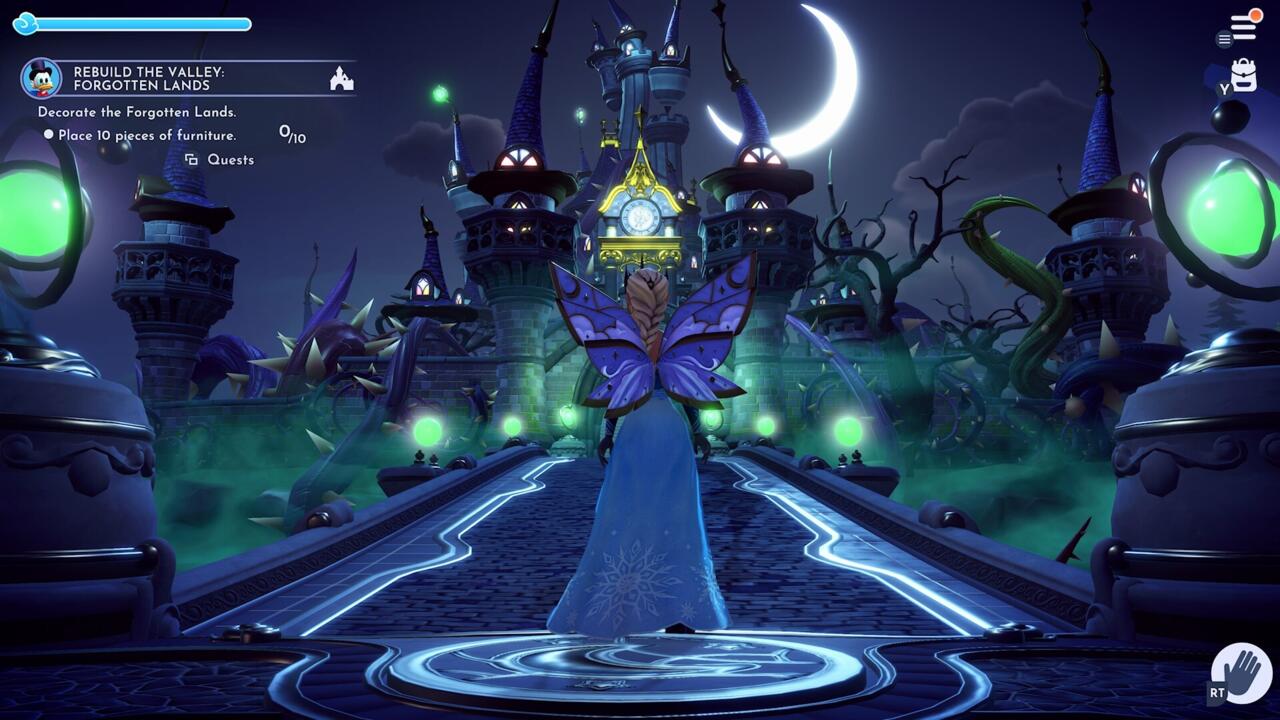Disney Dreamlight Valley entered early access at the end of 2022, and the Animal Crossing-meets-Mickey Mouse gameplay immediately caught on in my house. The light and easy gameplay paired with soft music and the presence of some of the world’s most family-friendly characters made for low-stakes gaming sessions that served as a nice break from whatever review was on my slate.
I honestly didn’t expect much from the game; Animal Crossing never leaned heavily into its story so I didn’t expect Disney Dreamlight Valley to do more than roughly as much as Nintendo’s hit franchise. However, throughout the past year, the writers at Gameloft not only exceeded that expectation, they did so with a real and raw look at childhood, adulthood, and the transition between the two. It was a bold choice–and definitely one that flies in the face of “life simulator starring Mickey Mouse and friends”–but it’s a tale I’ve routinely thought about since completing it.
SPOILERS for Disney Dreamlight Valley’s first year of content is below, proceed with caution.
For those who don’t know the story, Disney Dreamlight Valley follows a protagonist who returns to the valley they created as a child after years of being away, only to find him in disrepair thanks to an event called The Forgetting. Houses are falling apart, insidious vines are growing everywhere, and the previous inhabitants are either missing or suffering from amnesia. Our return seems to awaken our latent Dreamlight magic abilities, and from there we set off on restoring the valley to its former glory.
The vines represent a darkness that’s fallen over the valley, which itself was brought on by The Forgotten, a malevolent presence who corrupted the idyllic world by unknown means. Through writings, we learn more about the origins of this dark being, until finally we meet the villain face-to-face–and they look surprisingly familiar. Herein lies the twist: The hero the player creates and The Forgotten are one in the same, with the “evil” version representing the young child creator’s transition from child to adult–and all of the angsty teenage years in between.
We’re fed this revelation in crumbs for the most part until that first meeting, but from then on is where the story really takes flight. So much so, in fact, that the game produces a content warning before the final missions of the game: “The Forgotten Memories quests deal with some difficult emotions and themes, such as sadness, loneliness, and anger,” the warning reads. “If you’re not in the right space to deal with these themes, consider returning to your village until you feel prepared to face them.”
By following the questline, we’re transported back in time to when the “darkness” began to take hold. We control the Forgotten version of ourselves as we meet up with familiar faces who ask us for familiar favors: Mickey wants flowers for Minnie, Goofy wants to make some food, etc. However, because of the clouded psyche of our character, all of our dialogue choices are turned to negative emotions. While talking to our friends, our speech is broken up by intrusive thoughts like “What’s the point of this?” or “I’ll just screw this up anyway.”
As we gather the items for our friends, something’s off: The flowers we find for Mickey are dead, and the food ingredients for Goofy are rotten. When the Forgotten delivers the items to their friends, and the reactions aren’t what they’d expect, the Forgotten immediately begins to descend back into that anxiety, as one of the dialogue options is “I just want to be alone!” while another is simply “UGH! UGH! UGH!”
While these moments went over my children’s heads, I was all in. These are familiar feelings for a lot of people as they grow from children to adults. Things they once loved lose their luster, tasks they once enjoyed seem menial and annoying. Self-doubt, anxiety, overreaction, and more are all part of the growing-up process, and Disney Dreamlight Valley does a terrific job of showcasing this through these scenes.
Eventually, back in our created character’s shoes, we’re tasked with gathering “hidden relics” of the Forgotten’s past; a blanket, a shovel and pail, and a child’s drawing of a lion. We then travel to the Forgotten’s world, which is a dark and twisted version of the castle that sits in the middle of the valley. This castle has been completely overtaken by the darkness, with vines growing through and walls and floors. When we reach the Forgotten, we’re transported to a world of pure darkness, save for a few areas with spotlights above them.

Using the “relics” of the past, we’re able to learn the truth: The Forgotten is our character’s lost childhood made manifest, as they say they’re bringing darkness to the valley to “make sure no one goes through what [they] went through.” By restoring sacred areas of their past–the shovel and pail in a sandbox, the blanket on their childhood bed, and so on–we convince them that darkness isn’t the way, and the day is won.
The best part is what happens to the Forgotten after this final mission concludes: They don’t disappear in the light, they don’t get impressed in the dark castle, they simply become just another villager. From there, a new questline opens where the player character and their forgotten childhood work together to make the valley a better place for all.
I didn’t expect such a whirlwind tale in my Mickey Mouse cozy life sim, but Gameloft stealthily hid one of the best stories of the year right in between trips to Scrooge’s shop and interior decorating.


